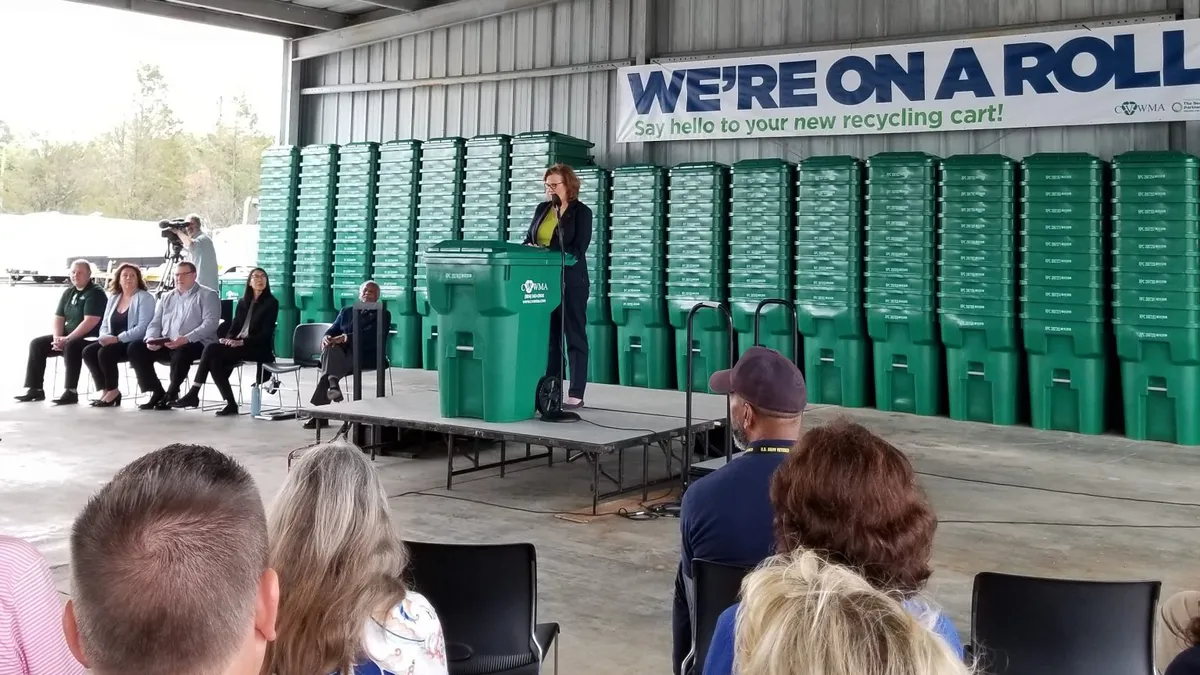Dive Brief:
- Closed Loop Partners has invested about $15 million in the past year for municipal recycling infrastructure improvements and services in Virginia, Iowa and Missouri, the firm said.
- Closed Loop’s catalytic private credit arm, the Closed Loop Infrastructure Group, invested in a project that upgraded 90,000 recycling carts in Virginia and 162,000 in Missouri, as well as a MRF equipment upgrade project in Iowa.
- The upgrades Closed Loop’s Infrastructure Group financed over the years have saved municipalities about $40 million by keeping materials out of landfills, the firm said.
Dive Insight:
Closed Loop views investments in local municipalities as a key part of improving the country’s recycling infrastructure, in part because it has seen local waste authorities and local governments enter into strong public-private partnerships and foster ongoing community relationships. On their own, however, municipalities often lack access to the type of funding they need to make large-scale improvements, the firm said.
Cities have also cemented partnerships with organizations like The Recycling Partnership and the American Beverage Association to complete projects aimed to make recycling cart access more equitable while collecting a higher volume of recyclables each year.
In July, the Closed Loop Infrastructure Fund provided a $4 million loan to the Central Virginia Waste Management Authority to purchase about 90,000 new 95-gallon recycling carts, upgrading from smaller 24-gallon carts.
Kim Hynes, executive director of CVWMA, said the project provides better recycling access for residents in the region while also allowing haulers to collect up to four times more material. Seemingly minor design details of the new carts — better lids and wheels, for example — will reduce litter and increase recycling rates because they are easier to take to the curb, she said.
Closed Loop also estimates the larger carts will bring in between 5,000 and 7,000 more tons of recyclables per year, with the potential to rise to 8,000 tons per year.
The cart rollout happened alongside other recycling initiatives, such as an education and outreach program led by The Recycling Partnership. TRP also provided a $1.5 million grant for the project.
“Not only are residents able to recycle more, we are providing the tools to engage residents to recycle if they are not already,” Hynes said during a community event unveiling the carts.
Hynes also touted the project’s partnership with cart manufacturer Rehrig Pacific. About 10% of the carts’ plastic comes from materials collected in the central Virginia region. The carts themselves contain 35% post-consumer recycled plastic, including plastic from old trash cans in the region. “We’re truly closing that loop here,” she said during the event.
Kansas City, Missouri, also undertook a similar project this year when it bought 162,000 new 60-gallon carts from Rehrig to replace some of the city’s old 20-gallon models. It was part of a public-private partnership with the city, TRP, and Dow, as well as the American Beverage Association’s Every Bottle Back initiative. The city also received a $5.4 million loan from Closed Loop to help finance the purchase.
The city’s opt-in recycling system previously required residents to purchase or use their own recycling bins, but Kansas City Mayor Quinton Lucas said in a statement the new bins will make recycling more equitable and bring the city closer to “achieving a clean and green city and reaching our goal of climate neutrality citywide by 2040.”
Closed Loop estimates the bigger carts will help collect 2,000 to 3,000 tons of additional material per year, but could incrementally increase to 10,000 incremental tons per year.
Closed Loop has also worked on MRF equipment projects this year. In Iowa, the Waste Commission of Scott County is planning a series of equipment upgrades to its MRF, including the installation of three optical sorters. Closed Loop announced the $5 million loan last year, and American Beverage announced it had provided an additional $600,000 for the project as part of Every Bottle Back.
When installed, the equipment upgrades could add about 3.5 million pounds of additional capacity, which Closed Loop estimates would result in an additional 900,000 pounds of recovered materials each year.
Closed Loop worked with the commission in 2015 and 2018, when it helped finance new single-stream recycling carts and infrastructure improvements, it said.











